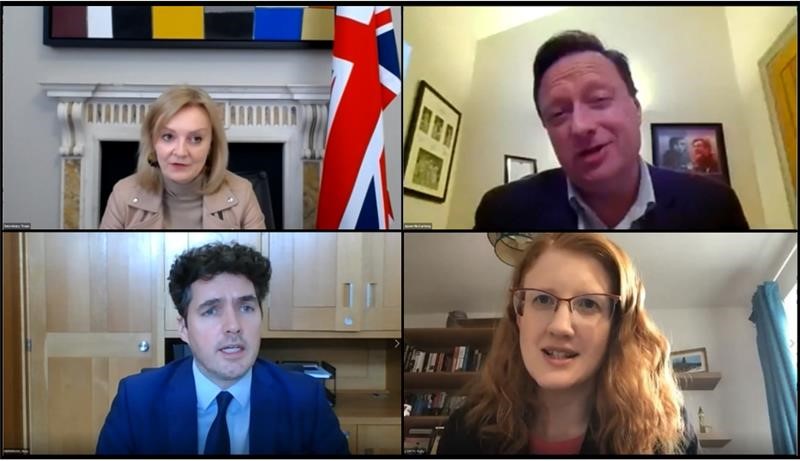
10 March 2021
International Trade Secretary Liz Truss affirms importance of Fairtrade to UK trade agenda and overseas development
The Secretary of State for International Trade Liz Truss MP has praised the ‘huge benefits’ of Fairtrade for British consumers and producers overseas, and has emphasised the need for ‘values-led trade policy’ that promotes environmental sustainability, international development and gender justice.
The Trade Secretary made these comments to an audience of peers, MPs, business representatives, Fairtrade campaigners and supporters at a virtual event held on Monday, hosted by the All Party Parliamentary Group (APPG) for Fairtrade in collaboration with the Fairtrade Foundation.
The event focused on how UK trade policy can best support the UK’s climate ambitions and deliver on its commitment to poverty reduction – and the role Fairtrade can play in supporting this vision. It marked the close of Fairtrade Fortnight and coincided with International Women’s Day (March 8), both of which Liz Truss described as ‘very important for the UK’s trade agenda’.
She said: ‘I’m a huge supporter of Fairtrade. I think it’s brought huge benefits across the world, both to the people consuming the goods and of course to the people producing the goods.’ She continued: ‘I’m a believer in free trade and I’m a believer in Fairtrade… Fairtrade is about making sure that the trade we do is in line with our values, so it doesn’t undermine for example our high standards on animal welfare, it doesn’t undermine the environment. We also need trade that treats people properly.’
During the event, the Cabinet Minister answered questions from a range of audience members. Chair of Fairtrade Africa Mary Kinyua, a flower producer based in Kenya, highlighted the disproportionate impact of the climate crisis on farmers in low-income countries. Ms Kinyua, Fairtrade’s representative on the COP26 Civil Society and Youth Council, asked what action the UK government would take to ensure that trade helps reduce carbon emissions, rather than driving them up, and how it would support producers and businesses who want to reach Net Zero in their supply chains.
In response, Liz Truss said:
‘Of course the UK is deeply concerned about climate change… it’s having a very devastating effect across the world, including in Kenya, affecting crops, affecting everybody’s futures. This is a global problem for which we need a global solution.’
She continued: ‘In terms of trade it’s clearly vitally important that the trading system doesn’t allow carbon leakage…if one country has a Net Zero target, we can’t simply export carbon production elsewhere: we have to make sure that there is a system across the world that prevents that carbon leakage.
‘…The issue of climate change must be factored into global trade. The UK is committed to working on this with partners, through the G7, through the G20, through the World Trade Organization. This is an issue that needs a global solution to make sure that we’re not simply moving the carbon, [but] that we’re actually dealing with the issue at an international level and have a solution that works.’
The discussion with Liz Truss, who is also Minister for Women and Equalities, also explored the need to empower women overseas to earn better incomes and access international markets. Speaking from Sumatra, Indonesian Fairtrade coffee grower Mahyana Sari, from the Aringata Cooperative, asked about the Trade Secretary’s plans to enable more women to become more economically independent.
Answering, she said: ‘We can make sure that in every trade deal we’re doing we’re opening up more opportunities to women led-businesses… I believe we can use our trade deals and use our work through the G7 to bring more economic benefits to women in particular – and that will benefit everybody.’
‘AS CONSUMERS WE CAN CHOOSE FAIRTRADE’
There were also questions from Year 5 children from Riddlesworth Hall, a Fairtrade school in Diss, the Secretary of State’s constituency. They were curious about her own shopping habits, how the UK could support Fairtrade and how wealthier countries could assist lower-income nations.
Stressing the importance of making ethical choices, the Trade Secretary told them:
‘First of all as consumers we can choose Fairtrade products, whether that’s Fairtrade bananas, Fairtrade cocoa, Fairtrade chocolate: and of course I look for those products in the supermarket,’ she said, adding that ‘the Government is a long-term supporter of the Fairtrade movement’.
Elsewhere, in a summary of trade policy priorities, Liz Truss mentioned the need to remove barriers to trade for developing countries, explore avenues for strengthening the trade preference scheme and improve labelling on imported goods, including product of origin labelling: ‘I think consumers increasingly want to know that their products are being produced in an ethical way… Consumers are really voting with their feet, as they have done in supporting Fairtrade products.’
She continued: ‘The whole way that the Fairtrade movement has worked is by empowering consumers to make better choices. So in my view the key area we need to focus on is better labelling, so that consumers understand better what they’re buying and they understand the implications for producers.’
Monday’s event was chaired by Fairtrade APPG Vice-Chair Huw Merriman MP, and featured opening and closing remarks from APPG Co-chairs Holly Lynch MP and Jason McCartney MP.
Huw Merriman MP said:
‘The event was an excellent opportunity to learn more from Fairtrade producers and supporters about the challenges they are currently facing; from how to boost incomes, to the threats posed to their livelihoods by climate change. The Secretary of State provided interesting insights into how breaking down barriers to trade internationally will allow some of the world’s poorest farmers to access new markets to sell their goods, and how, as we prepare to host the COP26, the UK’s trade policy can help tackle climate change.’


